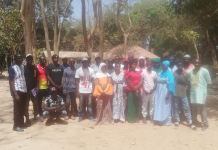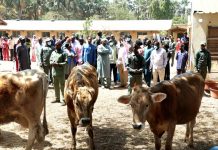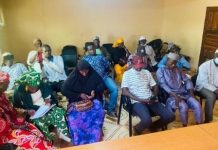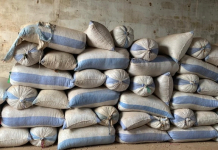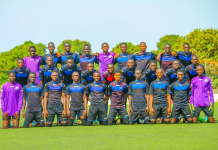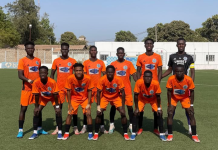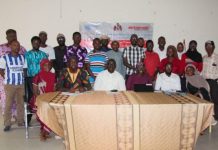By Madiba Singhateh
The National Beekeepers Association of The Gambia (NBAG) kicked off a five-day apprenticeship training on 1st April 2025 at their head office in Brikama Nyambai, aimed at equipping 20 youth with the skills to construct Kenyan Top Bar Hives (KTB). The training, funded by the Food and Agriculture Organization (FAO) under the Forest and Farm Facility (FFF) Phase II, is designed to support beekeepers in the West Coast Region, Foni, and parts of the Lower River Region (LRR).
Jerro Maane, the Beekeeping Technical Adviser, highlighted that this training is in line with FFF Outcome 2, which focuses on “increased entrepreneurship, access to markets, and finance through gender-equitable value chains.” He emphasized that the initiative would help address challenges faced by beekeepers who struggle with the wear and tear of their hives due to age, termites, bush fires, or vandalism. In such situations, many beekeepers find it difficult to access carpenters with the necessary skills to construct new hives.
Maane explained, “This training is based on the justification that hives distributed to beneficiary communities often wear out from old age or unforeseen circumstances. In these situations, it becomes difficult for the victims to access carpenters skilled in KTB hive construction. Beekeepers who wish to expand their operations also face challenges in finding carpenters with these skills. This apprenticeship training is designed to address these problems, which are constraining the sector.”
The training aims to create new capacities that will allow apprentices to provide hive construction services directly to beekeepers in their communities. To ensure the sustainability of the initiative, the apprentices will be supported in forming two carpentry groups—one in Foni and one in Kiang West. These groups will be registered with the Attorney General’s Chambers at the Ministry of Justice and the Gambia Public Procurement Agency (GPPA), allowing them to bid for government contracts and create green jobs for young people.
Kanimang Camara, representing the FFF, further explained the significance of the project. “We are organizing this apprenticeship training to equip 20 youths with the skills and knowledge required to construct the Kenyan Top Bar Hive, which is the most common hive used by beekeepers in The Gambia. The objective is to create green jobs and reduce migration by providing youths with opportunities to stay in their communities and work,” Camara said.
Siaka Manga, the Managing Director of NBAG, also addressed the participants, urging them to value the training as beekeeping and honey production can be lucrative businesses. “I encourage you to make the most of this training, as it holds great potential for your future,” Manga added.
The apprenticeship program aims to empower the youth, providing them with practical skills that not only support the beekeeping industry but also foster economic opportunities in rural areas.




